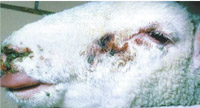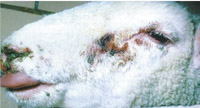
Promise of international aid will help combat screw-worm fly epidemic [Archives:2008/1149/Front Page]
April 24 2008
 |
SANA'A, April 23 ) Yemeni National Atomic Energy Agency and United Nations' Food and Agriculture Organization (FAO) will donate goods and services worth US $50,000 to Yemen for this and next year in order to combat the screw-worm fly emergency (also known as myiasis or fly strike), said Khalid Al-Ahmed, the general manger of examination and authorization in the Atomic Energy Agency.
The Ministry of Electricity and Agriculture recently participated in a conference held by the Atomic Energy Agency to help support Yemen's fight against myiasis.
According to Mansour Al-Qadasie, the general manger of the veterinary laboratory in Ministry of Agriculture, international experts will come to Yemen in the coming days to study the situation and then contact others in the region like Iran, Iraq, Saudi Arabia and Oman.
“We cannot just work in Yemen its self, because countries in the region have the same problem, and screw-worm fly will move and travel to other countries, which is why there must be joint work,” said Al-Qadasie.
One of the solutions to the problem could be circulating sterile insects to breed with the infected flies, noting that the sterile insect cannot give birth to a normal one.” said Dr. Ghalib Al-Eryani, general manager of the Agriculture Ministry's Animal Wealth Administration.
“If the epidemic spreads, Yemen will suffer huge economic losses estimated in the billions from animal wealth revenues,” added Al-Qadasie.
The danger of myiasis stems from its rapid spread, which makes it a fatal epidemic causing tremendous humanitarian and economic losses within a short period, notes Al-Ahmed.
Also, screw-worm fly can hurt people as well. The flies' eggs can be implanted into people, especially those with poor access to sanitation. The attacks may lead to death, particularly among those children living in polluted environments. Additionally, it may kill the elderly unless the larvae are extracted and the site is purified via suitable antibiotics.
This epidemic could also decrease an animal's ability to produce milk and meat, in addition to widespread animal death. Treating the disease sometimes requires cutting out the animal's infected organ, Al-Eryani added.
The Ministry of Agriculture said that Yemen can rid itself of screw-worm fly in 10 years. The screw-worm fly appeared in Yemen for the first time in December 2007, and is now spreading to other areas. The seven governorates are already suffering form screw-worm fly are Sa'ada, Al-Hodeidah, Hajja, Taiz, Al-Mahweet, Amran, and Al-Jawf, according to Al-Ahmed.
10,592 villages have been surveyed since December 2007, and there are 10,902 infected and cured sheep, 268 cows, 229 camels and 4132 goats. Myiasis has also caused 1,116 animal deaths, said Al-Ahmed. Over 63,000 other animals have been vaccinated since last December, and there are currently 34 field teams working on the problem.
The conference resulted in a contribution of US $50,000 to combat the problem. The support will focus on finding a quick solution by strengthening the central veterinary laboratory and also improving the agricultural laboratories, adds Al-Eryani. To improve laboratories, the donation will provide advanced microscopes for diagnosis and have a special training for Yemeni staff on the screw-worm fly. The training will also focus on controlling the disease through field observations of the flies' movement and biological characteristics. The training courses will be started as soon as possible, using international experts and will take 30 to 40 days.
The most important thing is local participation. “There should be some real means that can be used to teach the locals and the farmers in order to make them aware [of the problem],” said Al-Eryani.
——
[archive-e:1149-v:18-y:2008-d:2008-04-24-p:front]


